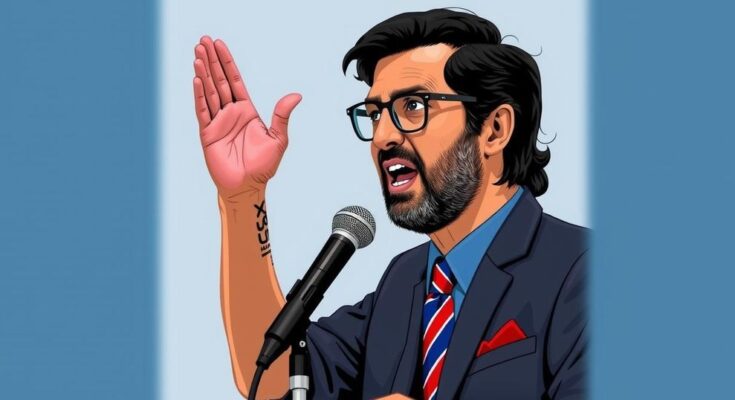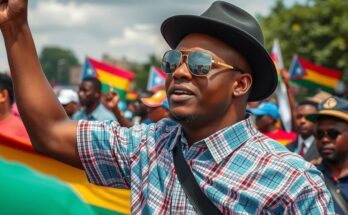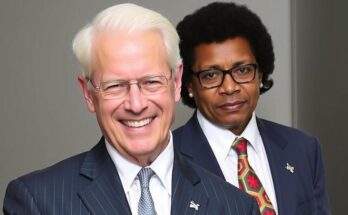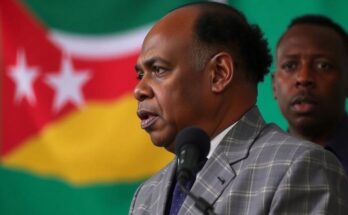Yamandú Orsi has won Uruguay’s presidential runoff, defeating Álvaro Delgado from the conservative coalition. With 49% of the vote amid robust turnout, Orsi aims to unite the nation while addressing key issues like poverty and organized crime, reflecting a continuation of the Broad Front’s successful governance. As he prepares to take office, Orsi promotes a moderate agenda aimed at economic growth and social stability.
On Sunday, Uruguay witnessed a significant political shift as leftist candidate Yamandú Orsi emerged victorious in a closely contested presidential runoff, defeating Álvaro Delgado of the center-right ruling coalition. Orsi, representing the Broad Front, won with just over 49% of the vote compared to Delgado’s 46%, following a campaign period marked by low youth engagement and muted anti-establishment sentiments. The electoral turnout reached an impressive 90%, indicative of Uruguay’s commitment to democratic participation.
As Orsi celebrated his victory, he emphasized the importance of uniting the nation, acknowledging the diverse sentiments among its citizens by stating, “Let’s understand that there is another part of our country who have different feelings today.” This conciliatory approach was echoed in his plans for governance, promising to remain moderate and build upon successful previous policies of the Broad Front, which facilitated significant economic growth and progressive social reforms during their prior governance from 2005 to 2020.
Notably, Orsi’s platform focuses on vital issues such as reducing childhood poverty—the current rate being a startling 25%—and addressing the rise in organized crime, while maintaining a steady balance of market-friendly initiatives alongside social programs. His predecessors, particularly José Mujica, have set a high bar for progressive governance, characterized by landmark advancements in social rights including abortion, same-sex marriage, and marijuana legalization. Orsi’s statements reflect a commitment to fiscal responsibility while proposing to attract investment to bolster the agricultural sector and reform social security without drastic upheaval.
Delgado conceded the election graciously, pointing out the electoral outcome as a reflection of rising public discontent regarding economic stagnation and lack of crime control under the current administration. Uruguayan voters seem to have responded to the prevailing socio-economic challenges by preferring a change in leadership over the status quo. As the nation prepares for Orsi’s inauguration on March 1, 2025, the atmosphere is one of cautious optimism, with expectations of a government focused on national dialogue and collaboration amidst the country’s diverse political sentiments.
The election of Yamandú Orsi as President of Uruguay represents a broader trend observed in various regions facing economic and social challenges, leading voters to favor anti-incumbent candidates. The shift from a conservative to a left-leaning administration reflects widespread dissatisfaction with existing government policies, particularly regarding economic recovery post-pandemic. Uruguay, known for its democratic processes and civil liberties, has a historical context of robust political engagement, influenced by its previous leadership’s progressive reforms. The Broad Front coalition, previously in power from 2005 to 2020, achieved notable successes in economic growth and social reform, establishing a solid foundation for Orsi’s platform. The political environment leading up to the election featured moderate candidates who struggled to galvanize young voters, contrasting with more radical populist movements in other countries. This unique trajectory has shaped Orsi’s vision, aiming to navigate the socio-economic landscape with a blend of innovation and continuity.
Yamandú Orsi’s election marks a critical moment for Uruguay as the nation transitions from conservative governance to leftist leadership in response to economic and social unrest. His approach seeks to balance progressive policies with economic pragmatism, aiming to address pressing issues while promoting national unity. As his administration prepares to take office in 2025, the expectation is for a government that fosters dialogue and collaboration, responding effectively to the aspirations and challenges faced by all Uruguayans.
Original Source: time.com




